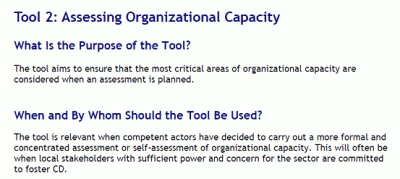
What should an assessment of organisation capacity look at? There is no right answer – those involved have to decide for themselves. But here is a tool to help you do precisely that.
Tool 2: Assessing Organisational Capacity, which is attached to this article and comes from the Toolkit for Capacity Development, is available to download from capacity4dev.eu, here.
Importantly – and differently from other “use-me-as-I-am-tools” - this checklist is not saying what should be assessed, but helping those involved to decide what to evaluate for themselves.
How broad and deep the assessment is, is very important for the subsequent CD processes. An excessively detailed assessment, resulting in a thick report, may end up on the shelves. A superficial assessment may circumvent sensitive areas, which in the final count, make or break a successful CD process.
Neither does this tool advise on how the key issues can or should be assessed as this can be done in many different ways. Those directly involved in the assessment should base their choices of assessment-instruments on professional judgment. Often, tools from the mainstream management consulting industry may be suitable.
The tool invites users to consider the following areas:
- organisational outputs (services and products, including regulatory services/products);
- inputs (monetary, human, and physical/technical resources);
- leadership;
- motivation and incentives;
- balance between functional and political dimensions of the organisation(s);
- fit between the formal and informal organisation(s); and
- networking capacity.
The importance of what to assess should not detract attention from the crucial question: who should assess? Click here for an introduction to the annex in the toolkit, which helps to find a good answer to that question. Or, look at tool 3 in the toolkit.
For more details about the areas listed, you may wish to refer to EuropeAid’s Institutional Assessment and Capacity Development—Why, What and How?
Log in with your EU Login account to post or comment on the platform.